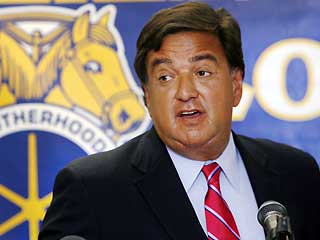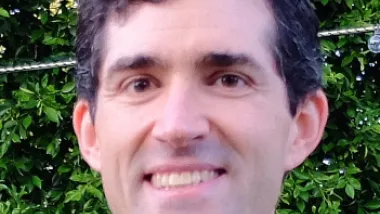This week Salon.com published a remarkable interview with a contender for the White House. The candidate didn't offer the solution to stabilizing Iraq, strengthening the economy, or bringing down the price of a six-pack (at least not directly), but for the first time in the history of American campaigning that I'm aware of, he referred to the issue of "land use."
This week Salon.com published a remarkable interview with a contender for the White House. The candidate didn't offer the solution to stabilizing Iraq, strengthening the economy, or bringing down the price of a six-pack (at least not directly), but for the first time in the history of American campaigning that I'm aware of, he referred to the issue of "land use."
 New Mexico Governor Bill Richardson is a long shot for the Democratic nomination, but he may have the planning vote locked up if he continues to discuss substantive domestic issues while Hillary and Obama squabble about who's tougher. The Salon interview focused on energy and climate change, which are, of course, sexier topics than planning. But Richardson -- who served as both U.N. ambassador and energy secretary under (the first) President Clinton -- took a break from circular discussions of MPG and "clean coal" to proclaim, in response to a question about environmental justice:
New Mexico Governor Bill Richardson is a long shot for the Democratic nomination, but he may have the planning vote locked up if he continues to discuss substantive domestic issues while Hillary and Obama squabble about who's tougher. The Salon interview focused on energy and climate change, which are, of course, sexier topics than planning. But Richardson -- who served as both U.N. ambassador and energy secretary under (the first) President Clinton -- took a break from circular discussions of MPG and "clean coal" to proclaim, in response to a question about environmental justice:
"I would issue an executive order that would respect neighborhoods, especially in minority areas; I would make it part of a 'Quality of Life Initiative.' It would have several components: promoting environmental justice, as well as a new open-space policy, a smart land-use policy and a new transportation policy that would emphasize light rail and more energy-efficient transportation."
When I read this, I thought for a moment that Andres Duany was running for president (with Stefanos Polyzoides as VP and Jim Kunstler as defense secretary, who would re-aim the nukes at strip malls and Orlando).
Most references to land use in national discourse are oblique at best. They come by way of environmentalism, agricultural policy, or, as in the Salon interview, energy policy. Though he was short on detail, Richardson's very use of the phrase "land-use" (and, for that matter, environmental justice) reveals an uncommon understanding of the importance of land use planning simply. It's uncommon simply because he acknowledges that such a thing exists. It's a pathetic state of affairs, but it gives Richardson an enormous opportunity.
(An interlude on journalism: Salon's insertion of hyphens in "land-use" and "open-space" demonstrates just how obscure those terms are in the mainstream media. Multiword phrases and terms of art lose their hyphens when they become commonplace; "land use" has not yet made the cut. It's also telling that the headline to a three-page interview is "Bill Richardson on Greening SUVs," as if SUVs are the only energy-related issue that Americans understand.)
Local efforts have, of course, been going gangbusters. These days it seems like every city is fighting to be the "greenest city in the country," and smart growth runs rampant, to varying degress of success. But with the exception of the intractable moral issues -- gay marriage, abortion, death penalty, etc. -- it's arguable that, in a country with hundreds of cities and 3 million square miles of territory, no national domestic issue is of greater importance to Americans than land use.
Land is, at heart, half of what makes a country a country (the other half being sovereignty), and it certainly has the most direct impact. While the Bush administration has allowed cities to languish (New Orleans and Minneapolis, anyone?), Richardson's call for parks, transportation, and equity exemplify the sort of tangible changes that America needs. Politicians can debate immigration, economic, and foreign policy to the most banal levels of abstraction, and voters can blithely pick their sides without ever expecting their candidates to keep their promises, but it's hard to argue with swing sets, sidewalk cafes, and clean air.
It's not hard to imagine how a president would achieve those priorities. I'm not sure what an "executive order" entails for a president who respects the separation of powers, but if the federal government took a fraction of the money spent on Iraq, mixed in even a modest repeal of Bush's tax cuts, and decided that poor people have dignity too, then every city in the country could frolic in new parks, whisk away on light rail, and pedal the streets on gold-plated bicycles (OK, the last one is a joke; but it's still less of a joke than Iraq).
Now that Richardson has broached the topic, he could easily retreat when some meaningless "hot button" issue arises. Let's hope he doesn't. Richardson's challenge is to take ownership of land use as he packages himself as the would-be "energy president" and to inform voters as he campaigns. If he succeeds, then maybe he'll inspire the celebrity candidates rise to his level of seriousness. I'm in no position to judge whether Richardson has the clout or wisdom to follow through on these promises, nor do I think he has a prayer of being elected (though VP is not out of the question). But while he has a ray of the spotlight, Richardson deserves tremendous credit for even daring to talk about a topic that, while near and dear to our hearts and to lives of millions, leaves almost everyone else in the dark.
(Note: Not that anyone cares, but this is not necessarily an endorsement of Bill Richardson for president. I'm still holding out for the return of Adlai Stevenson.)

Planetizen Federal Action Tracker
A weekly monitor of how Trump’s orders and actions are impacting planners and planning in America.

Chicago’s Ghost Rails
Just beneath the surface of the modern city lie the remnants of its expansive early 20th-century streetcar system.

Amtrak Cutting Jobs, Funding to High-Speed Rail
The agency plans to cut 10 percent of its workforce and has confirmed it will not fund new high-speed rail projects.

Ohio Forces Data Centers to Prepay for Power
Utilities are calling on states to hold data center operators responsible for new energy demands to prevent leaving consumers on the hook for their bills.

MARTA CEO Steps Down Amid Citizenship Concerns
MARTA’s board announced Thursday that its chief, who is from Canada, is resigning due to questions about his immigration status.

Silicon Valley ‘Bike Superhighway’ Awarded $14M State Grant
A Caltrans grant brings the 10-mile Central Bikeway project connecting Santa Clara and East San Jose closer to fruition.
Urban Design for Planners 1: Software Tools
This six-course series explores essential urban design concepts using open source software and equips planners with the tools they need to participate fully in the urban design process.
Planning for Universal Design
Learn the tools for implementing Universal Design in planning regulations.
Caltrans
City of Fort Worth
Mpact (founded as Rail~Volution)
City of Camden Redevelopment Agency
City of Astoria
City of Portland
City of Laramie






























